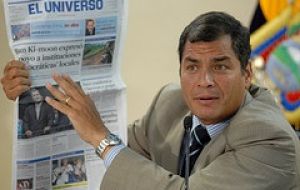MercoPress. South Atlantic News Agency
“Ecuador in the midst of a press freedom crisis”, claims IPI in-situ report
 “Tensions between a starkly polarised media and President Correa’s self-styled revolutionary government have never been higher”
“Tensions between a starkly polarised media and President Correa’s self-styled revolutionary government have never been higher” The International Press Institute (IPI) released a final report on its May 2012 press freedom mission to Ecuador, stating that the nation’s private media outlets are being targeted by the government of President Rafael Correa.
The nearly 30-page report enumerates diverse tactics directed at the private press by the Correa administration, including the pursuit of legal projects designed to weaken independent media outlets and the systematic employment of offensive rhetoric—publicly disseminated through government-run media—designed to tarnish the reputations of critical journalists, publishers, and press freedom groups.
“Ecuador is in the midst of a press freedom crisis,” said IPI Deputy Director Anthony Mills, who led the week-long mission. “The Correa administration has instigated a multi-fronted and very public attack on the private media, but it is the Ecuadorean people who are paying the price, as their right to independent information is threatened.”
Tensions between a starkly polarised media and Correa’s self-styled revolutionary government have never been higher. Arriving in Ecuador two and a half months after Correa successfully pursued and then later waived multi-million dollar criminal fines against the editors of El Universo newspaper and the authors of the book Big Brother, IPI delegates found that the government-press battle had become increasingly radicalised and increasingly visible. The escalation was on hand in the streets of Quito, where graffiti messages branded three private media outlets as “weapons of mass destruction,” among other negative epithets.
More specifically, the report criticises two recently passed legal measures: the so-called “Anti-Monopoly Law” and reforms to the electoral law, which appear poised to curtail the ability of independent media to raise essential capital and properly inform the voting public, respectively. Two additional bills currently under consideration—a new communications law as well as reforms to the country’s penal code—would further restrict critical investigative journalism.
Other serious points of concern highlighted in the mission report include the Correa administration’s frequent abuse of ‘cadenas’, presidential addresses that television and radio stations are required to broadcast and which are often used by the government to silence or distort criticism; the government’s continued control of seized media outlets it had promised to sell; the lack of will among private media, public media, and the administration to engage in meaningful dialogue; and the palpable sense of fear among both journalists and resigned editorial departments, which is already leading to self-censorship.
“An essential role of journalism,” the report observes, “is to question power for the well-being of the population, but when the safety and well-being of the reporter or fear are in play, as they are now, silence becomes the preferred option. The resulting lack of critical investigations can only affect society and democracy.”
IPI’s mission to Ecuador, led by Mills together with Mariela Hoyer, who attended as IPI’s Press Freedom Adviser for Latin America, took place from May 7 – 11, 2012. Visiting both Quito and Guayaquil, Mills and Hoyer sought to interact with a broad spectrum of actors, holding numerous meetings with government officials—including the country’s vice president, national communications secretary, and justice minister—editors, journalists, publishers, media owners, politicians, and civil society groups.
Hoyer explained that, despite the clear tension, “Our aim was to listen to as many points of view in Ecuador as possible, with an eye toward encouraging meaningful future dialogue. We believe it is essential for Ecuador’s media and government to understand and respect their reciprocal roles in a democratic society. The cooperation of both is needed to ensure an informed, empowered society.”
The report issues a series of recommendations to both the media and the government in Ecuador. IPI urges the media to maintain or introduce high ethical standards and install effective self-regulatory systems as tools to pursue greater credibility. Likewise, the report calls on the government to cease its confrontation with the media; to ensure close consultation with the press in drafting bills that directly affect it; to eliminate all laws that criminalise defamation; and to develop mechanisms that guarantee, not endanger, independent journalism.
Between IPI’s visit and the release of this report, the media situation in Ecuador appears to have worsened. Ecuadorean authorities shut down at least nine regional radio and television outlets, many of which had been critical of the government. In June, President Correa formalised a ban on cabinet ministers giving interviews to private media, and later suspended government advertising in newspapers that had criticised the decline of press freedom in the country. In early July, a freelance photojournalist was gunned down outside of Guayaquil. And just two months ago, Ecuador’s Constitutional Court lifted a temporary suspension on recently approved reforms to the country's electoral law, paving the way for journalistic restrictions on next February’s presidential vote.
IPI Executive Director Alison Bethel McKenzie said: “This summer’s events indicate that the findings and recommendations that have come out of IPI’s mission are more relevant and urgent than ever. We are committed to engaging long-term with the government and both public and private media, and are optimistic that sustained dialogue can mitigate the conflict.”




Top Comments
Disclaimer & comment rules-

-

-

Read all commentsMr. Assange will be happy with his chosen refuge !
Oct 25th, 2012 - 12:18 am 0Oh I see, so Assange can report whatever he wants then cowardly seeks refuge in the consulate of a country who's head of state does not believe in a free press in his own country. Banana republics are an endless source of amusement.
Oct 25th, 2012 - 02:10 am 0http://www.guardian.co.uk/media/2012/oct/24/ecuador-health-julian-assange?newsfeed=true
Oct 25th, 2012 - 05:09 am 0The Ecuadorians are claiming that Julian's lost sun tan is becoming a human rights issue.
Commenting for this story is now closed.
If you have a Facebook account, become a fan and comment on our Facebook Page!